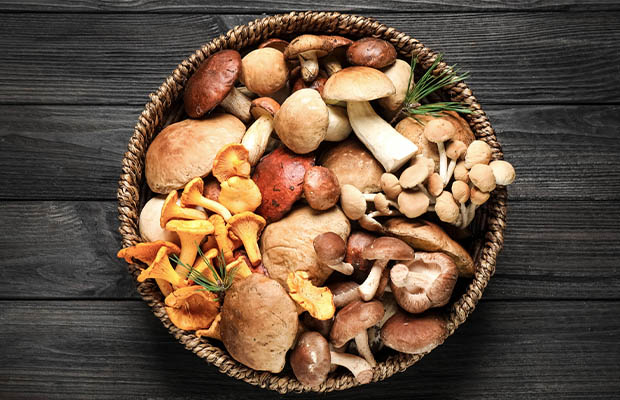How long do mushrooms last in the fridge? Mushrooms will last an average of 5 to 7 days in the refrigerator. A number of variables, such as type or form, can affect how long they are useful.
Pasta, risotto, meat roasts, and even savory pastries are all delicious dishes that benefit from the addition of mushrooms. These meaty vegetables have a high water content, which makes them prone to becoming slimy and spoiling quickly. Your mushrooms’ usability and freshness can both be increased by storing them properly.
Table of Contents
What Are Mushrooms?
A separate kingdom from plants and animals called the fungi is where mushrooms reside. They reproduce on their own through the germination of their spores, which is very similar to how plants produce seeds. They digest the nutrients they secrete rather than consuming food or light like plants and animals do. In particular, Asian and European cuisines use mushrooms in their recipes.
A very versatile ingredient in the kitchen, mushrooms have a high water content, a spongy texture, and a mild flavor. Because mushrooms contain a lot of water, storing them in the refrigerator for more than a few days may result in them becoming slimy or even developing mold and dark spots. Fortunately, there are several ways to store mushrooms in your refrigerator to extend their shelf life.
How Long Do Mushrooms Last?
Shiitake mushrooms, portobello mushrooms, and cremini mushrooms all have a limited shelf life that varies depending on how they are prepared. In accordance with the manner in which they are prepared, mushrooms can last for various lengths of time.

- 1. Whole mushrooms: The majority of whole mushrooms from the grocery store can be stored for up to two weeks in the refrigerator. After purchasing, it is best to eat them within seven to ten days.
- 2. Sliced mushrooms: Although grocery store pre-sliced mushrooms should be consumed within a week, some batches can spoil in just five days.
- 3. Cooked mushrooms: Sauteed mushrooms have a slightly longer shelf life than sliced raw mushrooms and can keep for seven to ten days in the refrigerator. Mushrooms can go bad sooner if they are used in a dish with other ingredients that spoil quickly, so it’s important to keep that in mind as well.
- 4. Marinated mushrooms: Mushrooms that have been marinated are those that have been dipped in olive oil, typically along with other ingredients like lemon juice and spices, and then covered with a lid and stored in the refrigerator. The majority of marinated mushrooms can keep for ten to fourteen days.
- 5. Dried mushrooms: If properly stored, dried mushrooms can last up to three years. On the counter or in the pantry, they can be kept at room temperature as opposed to being kept in the refrigerator.
- 6. Frozen mushrooms: Although you can freeze raw mushrooms, many of them lose their structure and turn mushy when you thaw them. Cook, blanch, saute, poach, or steam your mushrooms before freezing them to preserve their flavor and texture. Then, freeze each one until it is completely solid for a few hours on a baking sheet lined with parchment paper. To avoid freezer burn, place the frozen, loose mushrooms in a plastic bag that has been vacuum-sealed and is airtight.
Read More: How Long Does Ramen Last in the Fridge?
Do Mushrooms Go Bad?
Mushrooms that are still fresh can become bad and lose quality quickly. The majority of the packaged, store-bought variety doesn’t have a set expiration date, but they lose freshness over time.
Your mushrooms will quickly spoil if you don’t maintain good hygiene and keep them near moisture. The shelf life of fresh fungi can be extended by refrigeration, but if kept in the refrigerator for an extended period of time, they will start to turn.
In a moment, we’ll discuss how to store mushrooms, but first, let’s learn how long they last.
How To Tell If Mushrooms Have Gone Bad?
Here are some plainly obvious and less plainly obvious indications that it’s time to throw away your mushrooms. If in doubt, use your best judgment and err on the side of caution when deciding whether to cook, keep, or discard your mushrooms.
- They’re slimy. When it comes to gauging freshness, the most important rule-of-thumb is that slimy mushrooms are no longer suitable for consumption. When mushrooms are kept in the fridge for too long, they frequently become slimy. Even though they aren’t actually dangerous at this point, throwing them away is still a good kitchen practice.
- They have wrinkles. On occasion, older mushrooms dry out and develop wrinkles rather than becoming slimy. While it’s okay to dry out your mushrooms a little bit (since they are fairly moist vegetables anyway), you don’t want your mushrooms too wrinkly. Tossing them instead of eating them is a better option if they appear pretty shriveled.
- They have spots of darkness or are getting darker. Your fungi are beginning to rot if they have dark spots. The best thing you can do is to watch your mushrooms carefully the entire time they are in the refrigerator. It’s time to use them or lose them if you notice that they are becoming darker or showing dark spots.
- They’ve been here for at least two weeks. According to the general consensus, the maximum amount of time that mushrooms can be stored is two weeks in the refrigerator. Naturally, you should exercise your best judgment and common sense. They’re most likely safe to eat if they still appear healthy, smell good, and feel normal after just over two weeks.
- They emit an odor. Your mushrooms shouldn’t smell overtly pungent or noticeable. They are spoiled if you can smell them. The scent of mushrooms should be mild and undetectable unless you are sticking your nose right up to them. You know the mushrooms are bad when you pick up the bag, open it, and then have to turn around. Get rid of them!
How To Store Mushrooms Properly?
How should mushrooms be stored to maximize shelf life? Here are some suggestions for storing your mushrooms to help you make the most of them before they go bad.
- Let them breathe. Mushrooms should be stored so that they can breathe a little bit without becoming overly dry. Popular storage practices include placing them inside the refrigerator in a paper bag with the top loosely rolled up.
- Put paper towels and plastic bags to use. Stored in plastic bags with paper towels inside to help absorb moisture, mushrooms can also be kept relatively fresh for longer periods of time. If you don’t intend to use your mushrooms right away, be sure to change the towels frequently. In order to use them up before they expire, it’s a smart idea to try incorporating them into a variety of dishes.
- Maintain them in their airtight wrap. Keep them in the bags or sealed containers they come in, which is one of the most efficient storage methods. There is no need to put them in a different container when you get them home if they are packaged in a cardboard tub that is covered in plastic. Until you’re ready to use them, make sure you don’t open or tamper with them.
- Freeze them. Mushrooms can be frozen for a later date. But because mushrooms retain so much water, freezing them raw is much more challenging. If you’re going to do this, make sure to freeze them on parchment paper first and then quickly transfer them to an airtight bag with as much air pressed out as you can. The best way to freeze them is to cook them first, then place them in freezer bags or airtight containers (use whichever holds less air when sealed).
Can Mushrooms Be Frozen And Should You?
You may have purchased that pack of mushrooms from the grocery store, but you already know you won’t be able to use them all within the next 7 to 10 days. They can be frozen, which is good news.
It does, however, have some disadvantages. Because they contain so much water, mushrooms can appear a little depressed when they thaw out.
Mushrooms can be cooked briefly before being placed in a container to hibernate, or you can freeze them raw. They can be stored in the freezer for 9 to 12 months, but make sure to completely defrost them before using.
Takeaway
Because of their short shelf life, mushrooms should be consumed as soon as possible after being purchased. If you require quick access to fresh, prepared-to-eat mushrooms, cook and freeze or place in the refrigerator in a brown bag.
Larger mushrooms will keep for a little while longer, while cooked and cut mushrooms will keep for a little while less. If you still don’t have enough time, you can freeze your mushrooms. They’ll keep for almost a year, but keep in mind that during that time they’ll lose some of their nutritional value and might not look as pretty when they thaw.
Read More:


